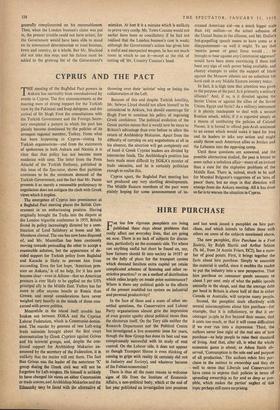HIRE PURCHASE
AR too few vigorous pamphlets are being r published these days about problems that really affect our everyday lives, that are going on now. There is no lack of subjects for discus- sion, particularly on the economic side. Yet where can anything useful but short be found on, say, how farmers should fit into society in 1958? or on the folly of plans for the transport system which demand limitless extra capital yet retain complicated schemes of licensing and other re- strictive practices? or on a method of distribution which relies largely on resale price maintenance? Where is there any political guide to the effects of the present muddled tax system on industrial and personal productivity?
In the face of these and a score of other un- settled questions, the Conservative and Labour Party organisations almost give the impression of even greater apathy about political issues than the electorate itself. On the Tory side neither the Research Department nor the Political Centre has investigated a live economic issue for years, though the Bow Group has done its best and was conspicuously successful with its study of rent control. On the Labour side, it does not appear as though Transport House is even thinking of coming to grips with reality (it certainly did not in Industry and Society), and whatever became of the Fabian economists?
There is thus all the more reason to welcome signs of life from the Institute of Economic Affairs, a non-political body, which at the end of last year published an investigation into pensions and last week issued a pamphlet on hire pur- chase, and which intends to follow these with others on some of the subjects mentioned above.
The new pamphlet, Hire Purchase in a Free Society, by Ralph Harris and Arthur Seldon (7s. 6d., from 24 Austin Friars, EC2), has a num- ber of good points. First, it brings together the facts about hire purchase. Simply to assemble the material is useful, since it enables the reader to put the industry into a new perspective. That hire purchase on consumer goods amounts to about 3, per cent. only of what the public spends annually in the shops, and that the average debt per head in Britain is about half of that in either Canada or Australia, will surprise many people.
Second, the pamphlet deals effectively with several misconceptions about hire purchase—for example, that it is inflationary, or that it en- courages people to live beyond their means, that it costs too much, or that it will cause difficulties if we ever run into a depression. Third, the authors never lose sight of the real aim of hire purchase—to help people to raise their standard of living. And that, after all, is what the whole economic game is about; as Adam Smith ob- served, 'Consumption is the sole end and purpose of all production.' The authors relate hire pur- chase to the instinct to ownership and they do well to stress that Liberals and Conservatives have come to express their policies in terms of spreading ownership as far and as deep as pos- sible, which makes the parties' neglect of this topic perhaps still more surprising.






































 Previous page
Previous page